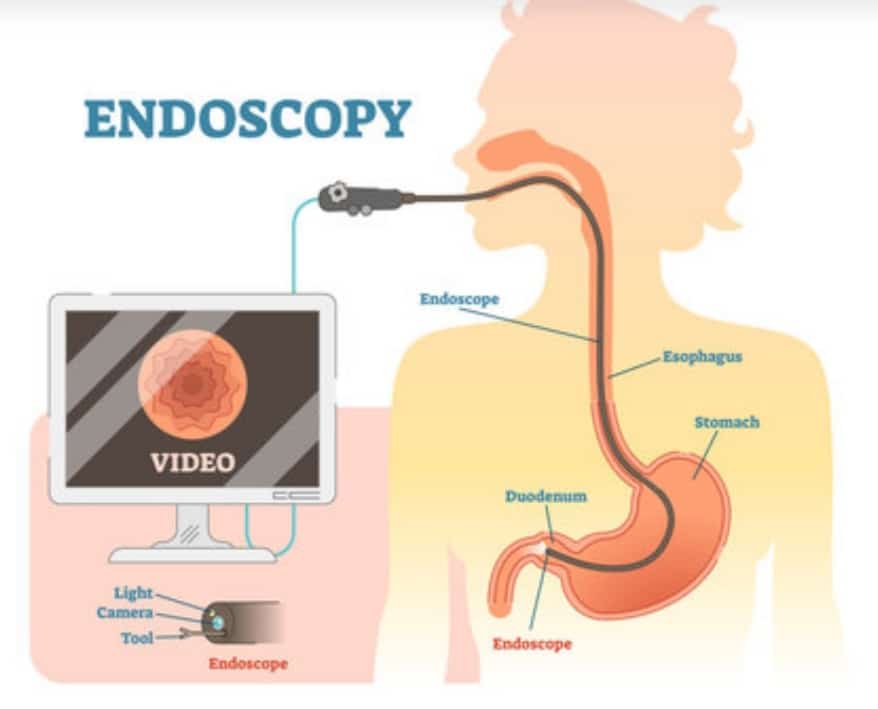One of the most popular and most versatile of all these procedures in endoscopy, am going to tell you all about it including the cost of endoscopy in Nigeria so that after reading this article, you will have a very good knowledge of it.
There are numerous medical procedures in the world and each of them has a place in the plethora of checks that doctors use to make sure that your body is in pitch-perfect condition. Without some of these tests, we would fall prey to many diseases which if not for these tests, we would have never discovered.
What is Endoscopy procedure?
An Endoscopy procedure is the insertion of a long, thin tube directly into a part of the body to observe internal organ or tissue in great detail. It is also used to carry out some other medical tasks such as imaging of the anatomy of the body and minor surgery.
As I said before, these Endoscopy procedures are actually investigations involving the passage of specialized viewing probes. In the case of gastrointestinal endoscopy, the said viewing probe is passed through the mouth and down to the intestines or through the anus and upwards to the intestines.
The gastrointestinal endoscopy is aimed at viewing the interior aspect of the stomach, small intestine, and the large intestine to correctly diagnose conditions such as ulcers, erosions in these parts, bleedings, and cancers. This procedure is recommended and advised for people with chronic gastrointestinal symptoms such as rectal bleeding, changes in bowel habits, serious vomiting, and difficulty in swallowing and painful abdominal pain or a worsening of these symptoms.
Types of gastrointestinal endoscopy include:
- Upper Gastrointestinal Tract Endoscopy – This is commonly done in cases where there is worsening of gastric ulcers, duodenal ulcers, gastritis or suspected malignancy (cancers). It is mainly aimed at viewing the stomach and parts of the small intestine. If malignant cancerous cells are suspected, then tissues samples will be taken for histological analysis.
. - Lower Gastrointestinal Tract (G. Endoscopy – This type is designed for viewing the large intestine and viewing parts of the small intestine that will not be seen in an upper G.I endoscopy. This type is used to diagnose various tumours of the large intestine and other diseases such as inflammatory bowel diseases.
Endoscopy Procedure
The procedures used will depend on the type of endoscopy used.
There are three reasons for carrying out an endoscopy analysis:
- Investigation of a problem: If someone is experiencing severe vomiting, severe abdominal pain, breathing disorders, stomach ulcers, or gastrointestinal bleeding, an endoscopy analysis can be used to look for a cause to these problems.
- Confirmation of a diagnosis: The procedure can also be used to perform a biopsy to confirm the diagnosis of cancer or of any other disease.
- Treatment: The endoscopy procedure can be used to treat an illness directly; example and endoscopy can be used to cauterize a bleeding vessel or remove a polyp from the body.
In some cases, endoscopy will be combined with another procedure such as an ultrasound scan for better efficiency. An endoscopy can be used to place the ultrasound probe near to organs that are difficult to image, such as the pancreas.
The most Modern endoscopes are sometimes fitted with sensitive lights that use narrow-band imaging, which uses specific blue and green wavelengths that will allow the doctor to spot precancerous conditions more easily and deal with them.
An endoscopy is usually performed while the patient is conscious, although sometimes the patient can receive a local anaesthetic; often, the patient is sedated.
If the endoscopy procedure will pass through the mouth, a mouth guard will be inserted to protect the teeth and lips as the endoscope tube is inserted.
The endoscopy analysis does not you to require an overnight stay in the hospital and usually takes 1 hour to complete. Your doctor will give you clear instructions about the necessary preparation for the procedure.
You may need to fast for around 12 hours, though this varies based on the type.
If the endoscopy involves the gut, then laxatives may be taken the night before the procedure to clear your system.
Before the endoscopy, your doctor will carry out an examination of your body please remember to mention all the drugs you are taking if any and any medical procedures you may have gone through in the past.
The use of Endoscopy is extensive and very helpful as it can be used to investigate many systems within the body such as:
- The Gastrointestinal tract: The oesophagus, stomach, and duodenum, the small intestine, the large intestine/colon, the bile duct, the rectum, and the anus.
- The Respiratory tract: The Nose, and the lower respiratory tract.
- The Ear:
- The Urinary tract:
- The female reproductive tract: the Cervix, the uterus, the fallopian tubes.
Cost of Endoscopy in Nigeria
The cost of endoscopy in Nigeria is actually very high and is still very expensive, it costs N15, 000 for upper GI endoscopy and is N17, 500 for lower GI endoscopy. The cost of endoscopy in Nigeria has discouraged patients and as long as the cost of endoscopy in Nigeria is high, our output will below. Because of this screening, the Nigerian public for colorectal cancer is not possible because no one will want to go to the procedure because of the high cost of endoscopy in Nigeria.
Our country should look into the cost of endoscopy in Nigeria and reduced it if possible, people will be deterred from going to the doctored for endoscopy analysis that is actually very important for their health if the price is too high. If the cost of Endoscopy in Nigeria was low, I can assure you that the rate of cancer in the country will be substantially low but that is not the case because some people can afford the high cost of endoscopy in Nigeria. Why others can’t afford the procedure.


